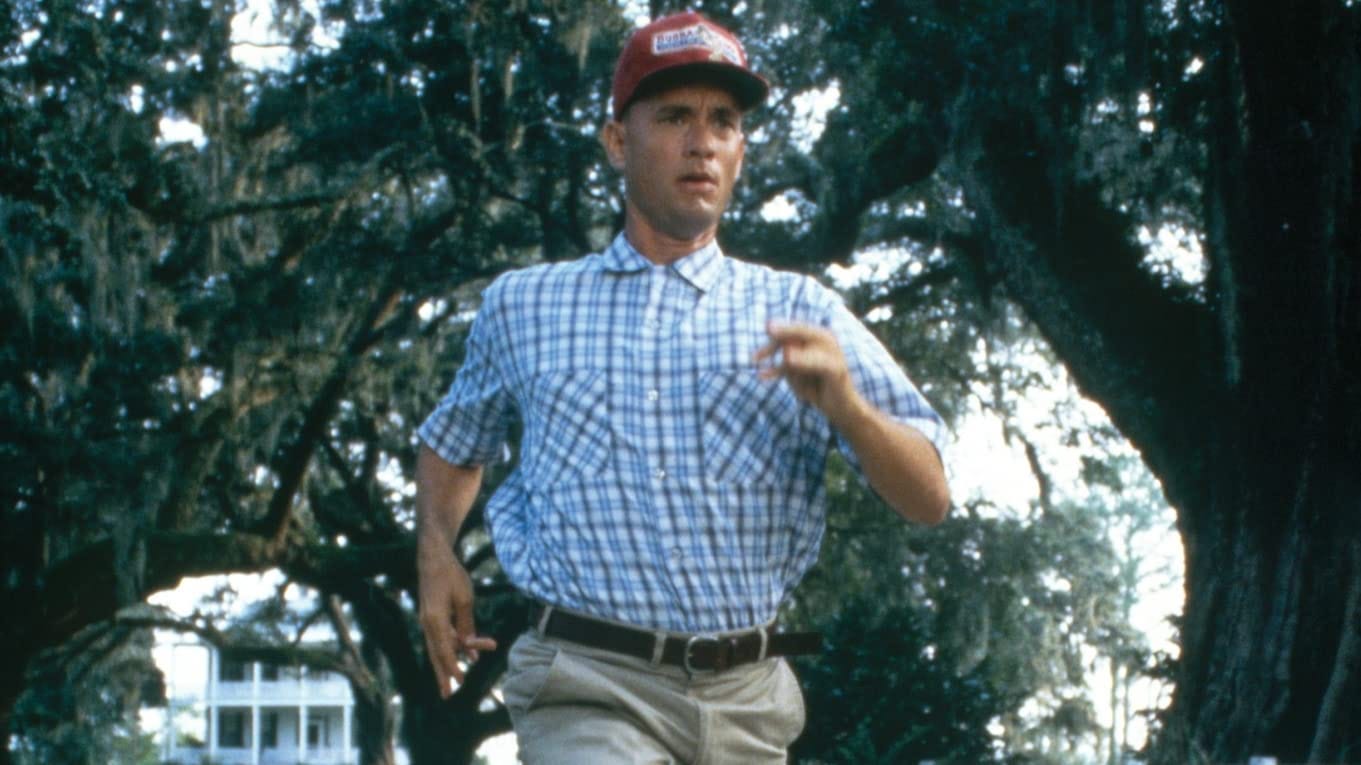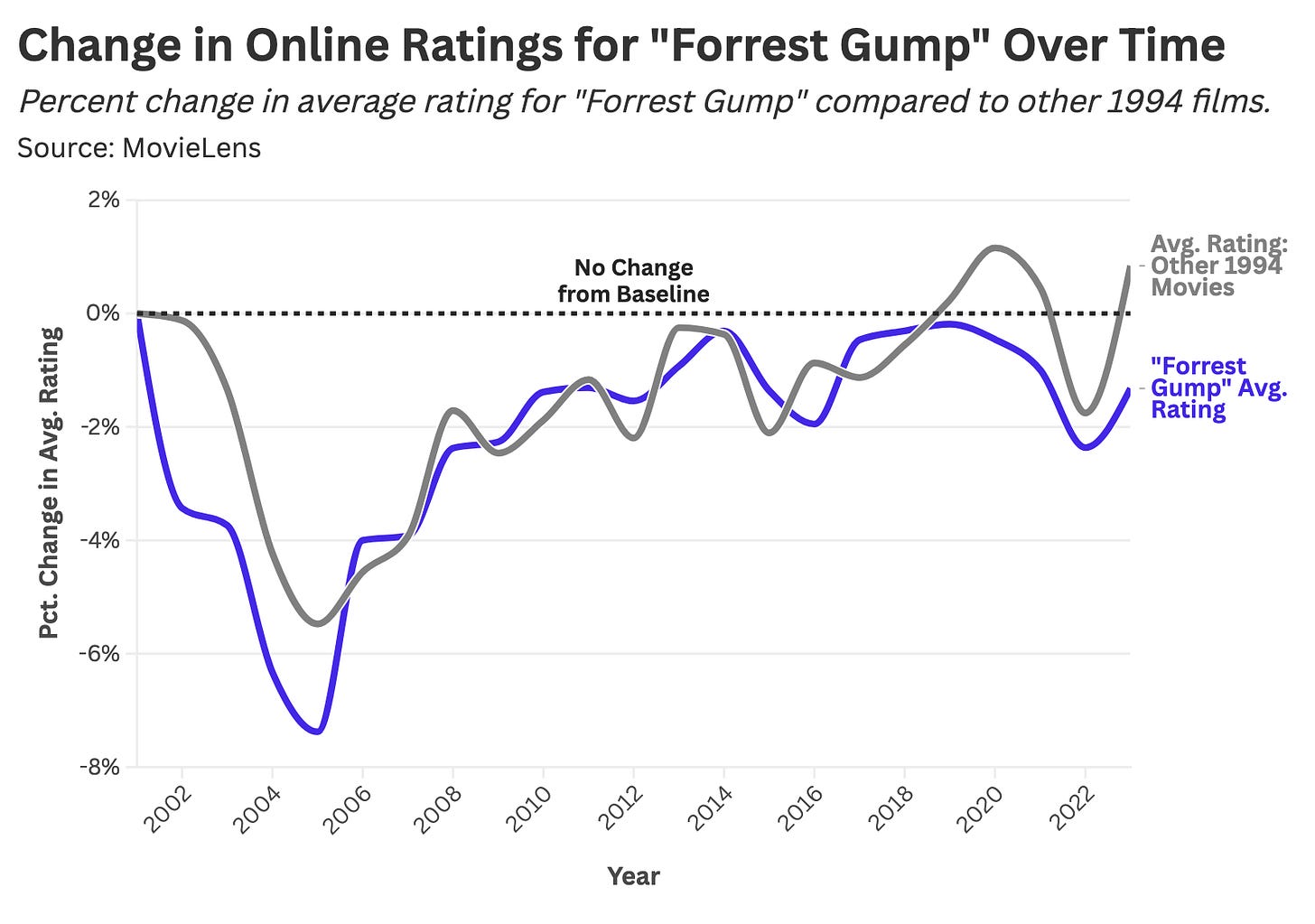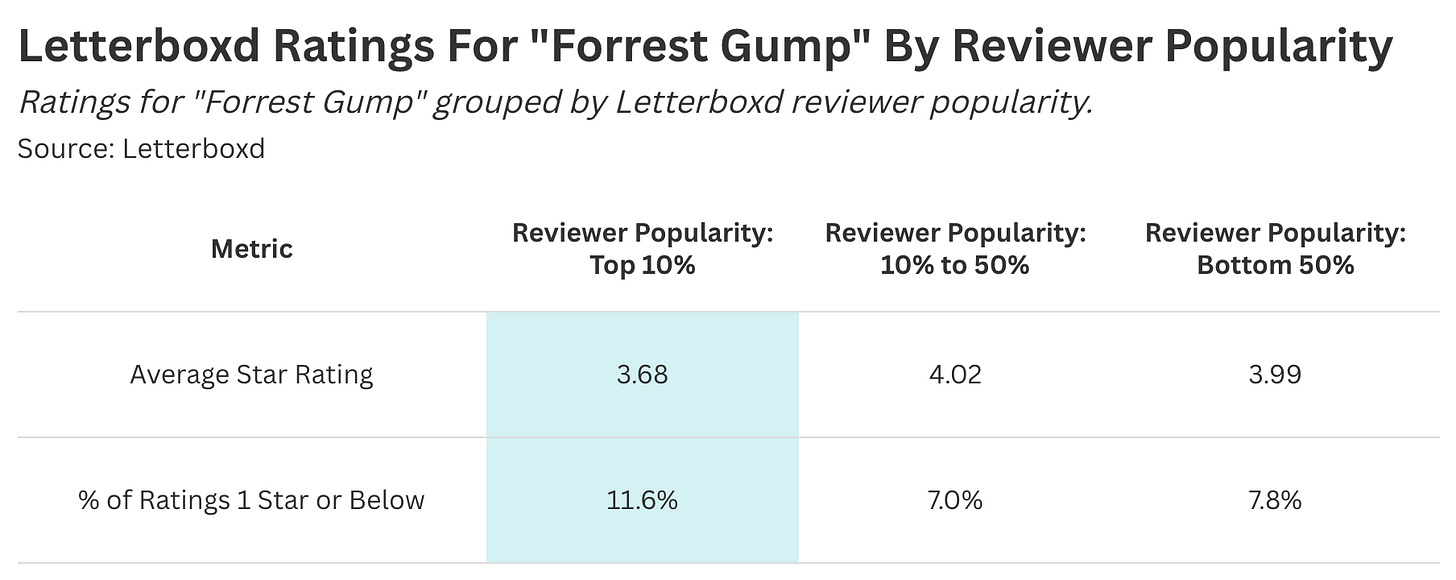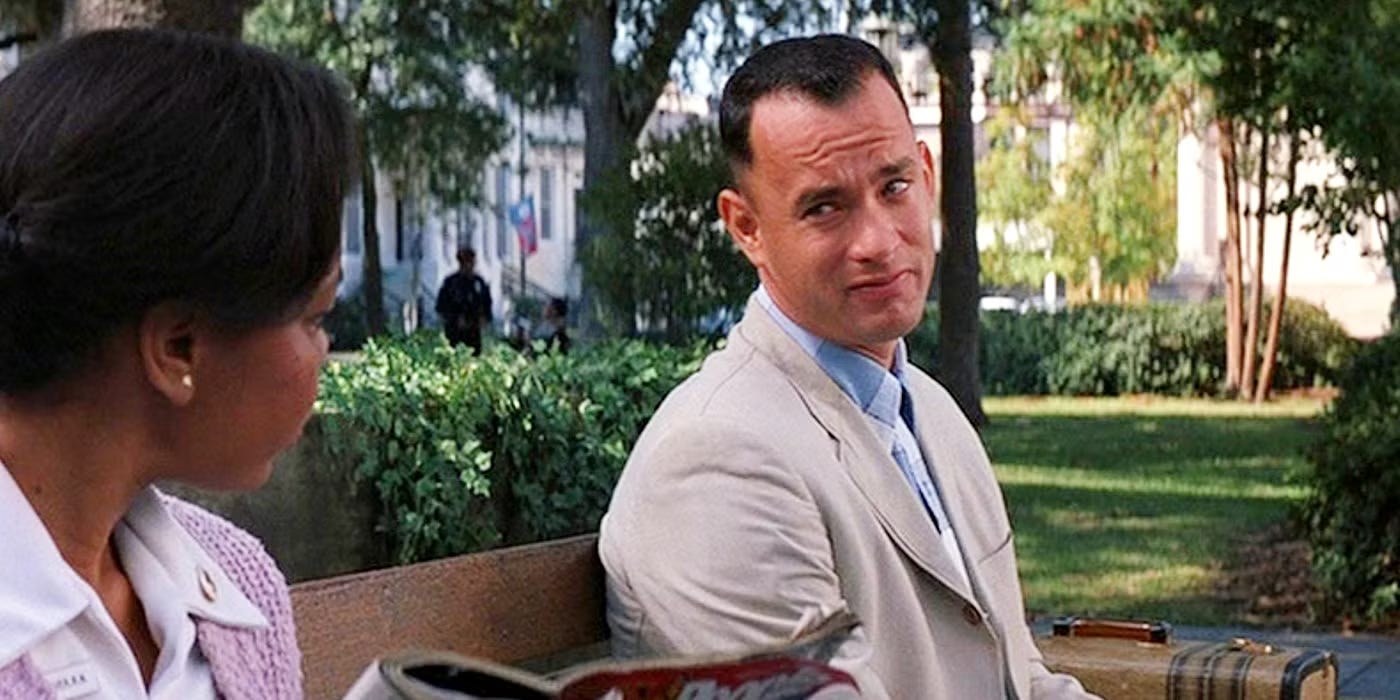Do People Actually Hate 'Forrest Gump'? A Statistical Analysis
Examining the legacy of 'Forrest Gump.'
Intro: Hating Movies That Are "Universally Loved"
For the first twenty years of my life, I was like anyone else—walking around thinking Forrest Gump was universally beloved—and then I saw This is The End. For those who may have forgotten, the 2013 comedy This is The End follows a group of celebrities (playing fictionalized versions of themselves) who are trapped together as the apocalypse unfolds. The film features a cast of early 2000s comedy stars, including Craig Robinson, Seth Rogen, Jonah Hill, and James Franco.
Early in the film, there is a comedic exchange between Emma Watson, Craig Robinson, and Jay Baruchel regarding hipster-dom and the merits of Forrest Gump:
Emma Watson (pointing at Jay Baruchel): "Look at him, he's like a hipster. Right?"
Jay Baruchel: "No. No, I'm not a hipster. At all."
Craig Robinson: "Yeah, you do seem to hate a lot of things and the bottom of your pants are awful tight."
Jay Baruchel: "No, I just... I don't like Los Angeles. That's it. It doesn't make me a hipster."
Craig Robinson: "I bet you hate movies that are universally loved."
Jay Baruchel: " I don't even..."
Craig Robinson: "You like Forrest Gump?"
Jay Baruchel: " No, no, it's a horrendous piece of shit."
I remember this line sparking uproarious laughter in the theater, and I also remember laughing along. Surely, no one actually dislikes Forrest Gump, I thought to myself; that movie has everything: Tom Hanks, state-of-the-art CGI, American history, shrimp, 100 quotable lines, a humming soundtrack of classic rock staples, a pleasing piano score, and absolutely no material that has aged poorly 🤷♂️.
But, alas, Forrest Gump hostility is real. Every year or so, major media outlets like Buzzfeed, Yahoo, GQ, and the BBC publish opinion pieces questioning the movie's long-standing popularity. Film podcasters and critics repeatedly use Forrest Gump as a punching bag—shorthand for popcorn entertainment unworthy of enduring cultural acclaim.
Recently, I re-watched Forrest Gump and was surprised how little I enjoyed the movie (relative to the 80+ times I've passively consumed it on cable TV). But is my newfound distaste for Forrest Gump the product of anti-Gump media, or is this actually a bad movie? Am I thinking for myself or simply following a herd of film podcasters?
So today, we'll explore Forrest Gump's legacy, unpack whether this 90s classic is still "universally loved," and examine who holds positive and negative opinions of this shrimp-centric blockbuster.
Does Anyone Dislike Forrest Gump?
The list of complaints leveled against Forrest Gump is vast and ever-expanding:
The movie won Best Picture over beloved classics like The Shawshank Redemption and Pulp Fiction.
Tom Hanks' portrayal of a man with below-average IQ could be read as offensive, kinda awkward, perfectly alright, incredible, or some combination of the four.
Forrest Gump, a movie about a fictional character who becomes a shrimp boat captain, spawned a real-life chain of shrimp restaurants (Bubba Gump)—which is just bizarre.
Jenny is repeatedly punished for cultural rebellion, and Forrest is continually rewarded for obedience and passivity.
The list of grievances goes on and on—some takes I agree with, while others feel like a stretch. Ultimately, the film's inescapability has made it an object of merciless reexamination. But is it possible to quantify this growing wave of scrutiny?
Utilizing user-generated reviews from MovieLens, we can track online ratings for Forrest Gump over time, comparing changes in sentiment to other marquee 1994 releases like Pulp Fiction, The Lion King, and The Shawshank Redemption. If the film's reputation has soured, we should see a divergence between Gump's average star rating and the average for other well-known 1994 releases. Alas, we see no such divergence.
We cannot quantify a shift in movie-rating sentiment, but perhaps we're losing valuable detail by looking at top-line averages.
Fortunately, YouGov and The Morning Consult have extensive survey data concerning Forrest Gump and other beloved films, allowing us to deconstruct viewer affinity by sentiment and demographic. When we look at Gump's standing relative to other classics, we find the 1994 Best Picture winner is "loved" and "liked" by a vast swath of YouGov respondents and, surprisingly, has few detractors "hating" on the movie.
Similarly, a 2023 Morning Consult poll found Forrest Gump to be the most popular Best Picture winner of all time (when sorted by net favorability rating):
Forrest Gump (1994): 76%
Titanic (1997): 65%
Rocky (1976): 62%
The Godfather (1972): 61%
Rain Man (1988): 57%
This same survey ranked Forrest Gump as the second most popular Best Picture winner among "avid film fans," just narrowly edged out by Titanic.
Okay, but surely, these surveys are lacking in granularity. There has to be a quantifiable contingent of Forrest Gump detractors, right?
Maybe not. YouGov recently polled American voters on their movie preferences vis-a-vis their preferred presidential candidate—an admittedly odd analysis (that yields intriguing data!). Shockingly, Forrest Gump is the most politically neutral film of the bunch, equally enjoyed by Trump and Harris voters.

According to this data, America, a country notable for not agreeing on things, agrees on Forrest Gump. I guess Americans just love this long-distance running, chocolate-box-obsessed, shrimp-catching rapscallion.
But wait, there's more! The YouGov and Morning Consult polls found Forrest Gump to be revered across every conceivable survey demographic, including:
Gender
Age
Race
Family income
Geographic region
So far, these statistics speak to Forrest Gump's universal appeal and not much else. But, alas, these datasets miss a crucial moviegoer segment—one with an outsized voice in film discourse.
Enjoying the article thus far and want more data-centric pop culture content?
Who Are Forrest Gump's Detractors?
So far, we've yet to identify a meaningful cohort of Forrest Gump detractors. I was about to give up on this analysis until I recalled two previously mentioned quotes from This is The End:
Emma Watson (pointing at Jay Baruchel): "Look at him, he's like a hipster. Right?"
Craig Robinson: "Yeah, you do seem to hate a lot of things and the bottom of your pants are awful tight."
Maybe—just maybe–there is a group of contrarian "hipsters" who are not being captured in our previous datasets. If that's the case, where could we find data produced by tight-pant-wearing, self-styled nonconformists who hate things and identify as "cinephiles"? Well, look no further than Letterboxd.
For those unfamiliar, Letterboxd is a social network for movie discovery where users can rate the films they've watched, create personalized lists, and follow other users to see what they're watching. If IMDb and early-stage Twitter had a baby, it would look something like Letterboxd. If there's any place in the world where you would find anti-Forrest Gump sentiments, it would be on this website.
Like any social network, a Letterboxd user accumulates followers, which dictates a reviewer's visibility on the site. The more popular a reviewer, the more likely their reviews are to surface on a given page (e.g., Forrest Gump's Letterboxd page).
When we segment Letterboxd users by popularity, we find that the site's most-followed reviewers tend to give Forrest Gump lower ratings and are disproportionately responsible for one- and zero-star reviews.
And which populations make up this elite cohort of Letterboxd reviewers? Well, this group consists of:
Professional film critics
Movie podcasters
Film bloggers
People who might identify as "influencers"
Apparently, and quite unsurprisingly, I've been immersed in an echo chamber of Forrest Gump-bashing. There is a small cohort of influential media punditry with a distaste for Forrest Gump who has dictated my Gump-related worldview—which is 21st-century media in a nutshell, I guess.
Final Thoughts: The Lost Joy of Simply Watching Something
Before starting this analysis, I was convinced everyone secretly disliked Forrest Gump and I was going to find some spectacular insight that proved my hypothesis true. Ultimately, the data revealed that I am 1) wrong and 2) parroting opinions shaped by an insular bubble of film hipsters.
Apparently, I’m woefully out of touch with the average moviegoer, the average American, Kamala Harris supporters, Donald Trump supporters, men, women, and people of all ages. I am, however, in touch with people who buy physical media, rate things on Letterboxd, subscribe to the Criterion Collection's streaming service, and follow Oscar coverage as if it actually means something.
Worse still, I wasn’t always skeptical of Forrest Gump. Throughout this analysis, I was repeatedly reminded of Tabula Rasa, the notion that our minds start as "blank slates," without innate ideas, before receiving outside impressions. As a kid, I sat down and watched Forrest Gump, and without interference or influence from others, I decided it was one of my favorite movies. I made this determination without checking Rotten Tomatoes, Metacritic, IMDb, Letterboxd, or The New York Times. How did I go from loving this film to attempting (and failing) to quantify its shortcomings?
When I was younger, I simply watched whatever cable TV offered—if that was Forrest Gump, well, then I guess I was re-watching Forrest Gump. I didn’t spend 45 minutes scrolling through streaming catalogs or avoid movies due to their perceived inferiority. I consumed and enjoyed most things.
At some point—probably in college—I was informed that certain content was “bad”: The Big Bang Theory, sequels, Inception, romantic comedies, How I Met Your Mother, all other shows with laugh tracks, superheroes, Michael Bay, Avatar, and, of course, Forrest Gump. Over time, I internalized these opinions. Now, I can’t help but wonder if my leisure time would be more satisfying if I focused on the simple pleasure of watching something—anything—rather than adhering to some self-imposed quality standard. Was this progression natural, or have I somehow made things harder on myself (or both)?
Maybe all this introspection is overblown, and my views on Forrest Gump don’t constitute some loss of innocence or detachment from humanity. Maybe there’s nothing wrong with being a person who “likes what they like.” Perhaps Forrest Gump is bad, and I’m just ahead of everyone else—especially in my skepticism of Bubba Gump (the real-life restaurant).
I’m not sure why I’ve grown to dislike Forrest Gump or if this shift in preference can ever be reversed, but I suppose I’ll have to accept that things change and that’s just how life works—like a box of chocolates where you never know what you’re gonna get.
Struggling With a Data Problem? Stat Significant Can Help!
Having trouble extracting insights from your data? Need assistance on a data or research project? Well, you’re in luck because Stat Significant offers data consulting services and can help with:
Insights: Unlock actionable insights from your data with customized analyses that drive strategic growth and help you make informed decisions.
Dashboard-Building: Transform your data into clear, compelling dashboards that deliver real-time insights.
Data Architecture: Make your existing data usable through extraction, cleaning, transformation, and the creation of data pipelines.
Want to chat? Drop me an email at daniel@statsignificant.com, connect with me on LinkedIn, reply to this email, or book a free data consultation at the link below.
Want to chat about data and statistics? Have an interesting data project? Looking to produce data-centric editorial content? Email daniel@statsignificant.com








A journey to self awareness
Entertaining & interesting article. Which I wouldn’t say of the movie. I saw it once and that was one time too many.